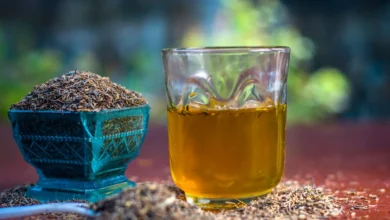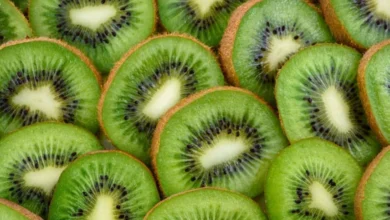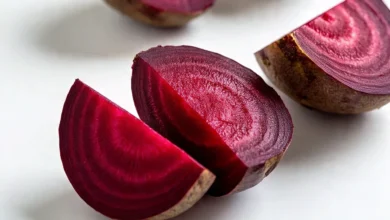Indian Jujubes: A Complete Guide

Indian Jujubes: In the vibrant tapestry of tropical fruits, Indian jujubes stand out as little gems of nutrition, tradition, and taste. Also called Ber or Indian plum , these fruits have been celebrated in Indian households, Ayurveda, and even ancient texts for centuries.
Their humble appearance hides a rich nutritional profile, health-boosting properties, and a delightful tangy-sweet flavour that makes them a beloved fruit across many cultures.
Whether eaten fresh, dried, or used in jams and pickles, Indian jujubes have carved a niche as one of nature’s underrated superfoods. But how exactly do they benefit our health? Are there any risks to keep in mind? Let’s explore everything you need to know about Indian jujubes, their nutrition, benefits, and even potential side effects, in this complete guide.
Indian Jujubes: What are Indian Jujubes?
Indian jujubes (Ziziphus mauritiana) are small, round to oval shaped fruits belonging to the Rhamnaceae family. Native to South Asia, particularly India, they are now also grown in parts of Africa, Australia, and the Middle East. The fruits typically start off green and ripen to shades of yellow, orange, or red, with a slightly wrinkled skin when fully mature.
The texture and taste of Indian jujubes can vary with ripeness. Fresh ones are crisp and juicy, tasting a bit like a mix between apples anddates. As they ripen further or are dried, they become sweeter, softer, and richer in flavour.
In India, jujubes are commonly sold by street vendors, often sprinkled with salt and spices for a zingy treat. In Ayurveda, they are cherished for their immune-strengthening, digestive, and anti-ageing properties.
Other names for Indian jujube include:
- Ber (Hindi)
- Badari (Sanskrit)
- Regi Pandu (Telugu)
- Ilantai (Tamil)
- Bor (Marathi)
Indian Jujubes: Nutritional information of Indian Jujubes
Here’s a snapshot of the nutritional composition of fresh Indian jujubes per 100 grams:
| Nutrient | Amount |
| Energy | 79 kcal |
| Carbohydrates | 20.23 g |
| Protein | 1.2 g |
| Fat | 0.2 g |
| Dietary Fibre | 2.6 g |
| Vitamin C | 69 mg (115% RDA) |
| Vitamin A | 40 IU |
| Calcium | 21 mg |
| Potassium | 250 mg |
| Iron | 0.48 mg |
| Magnesium | 10 mg |
| Phosphorus | 23 mg |
| Antioxidants (polyphenols) | Present |
Note: Nutrient levels can vary depending on the variety and ripeness.
What are the benefits of Indian Jujubes?
Indian Jujubes: antihyperglycemic activity
Ziziphus mauritiana seeds show strong blood sugar-lowering properties. In a study by Bhatia and Mishra (2010), when an aqueous ethanolic extract was given at a dose of 800 mg/kg, it significantly reduced blood glucose levels in animals. It also preventedweight loss, lowered mortality rates, and improved insulin sensitivity. These findings suggest that the plant could have potential benefits for managingdiabetesnaturally.
Indian Jujubes: Anti-Cancer Properties
The seeds and different parts of Ziziphus mauritiana have shown promising anti-cancer effects. Research by Mishra et al. (2011) found that the seed extract could induce apoptosis (programmed cell death) in HL-60 cancer cells, with an IC50 of 40 µg/mL. Methanol extracts from the bark were also effective against various cancer cell lines, especially lung cancer cells (Tagne et al., 2015). Additionally, silver nanoparticles made using fruit extracts triggered cancer cell death through reactive oxygen species (ROS) generation and FAS-pathway activation (Kabir et al., 2020). Animal studies showed that adding jujube fruit to the diet reduced colon cancer progression by controlling inflammatory and cancer-related pathways like NF-κB/IL-6/JAK1/STAT3 (Periasamy et al., 2015, 2020). Compounds like ursonic acid also helped block cancer cell invasion by affecting ERK and CREB signalling, while fruit extracts suppressed breast and cervical cancer cell growth by influencing genes such as Bax and Bcl2 (Abedini et al., 2016).
Indian Jujubes: Hepatoprotective (Liver-Protective) Effects
Extracts of Ziziphus mauritiana have demonstrated strong liver-protective abilities. Ethanol and ethyl acetate leaf extracts reduced liver enzymes and inflammation in rats with paracetamol-induced liver damage (Sawarkar et al., 2009). Similarly, an aqueous extract of the fruit lowered harmful liver enzyme levels and cholesterol in rats exposed to carbon tetrachloride (CCl4), a chemical that causes liver injury (Dahiru et al., 2010). Furthermore, a methanol extract of the stem bark improved the liver’s structure and normalised enzyme activities (Yadav et al., 2022), suggesting that the plant could help support liver health.
Indian Jujubes: Antioxidant Properties
The antioxidant effects of Ziziphus mauritiana are impressive. Aqueous leaf extracts boosted important antioxidant enzymes like catalase and glutathione peroxidase in experimental animals, helping protect cells from oxidative stress. Additionally, specific polysaccharides such as LZJP3, LZJP4, and SAZMP3, isolated from the fruit, showed strong free radical-scavenging abilities against DPPH radicals, hydroxyl radicals, and hydrogen peroxide (Wang et al., 2018; Lin et al., 2019). These properties make the fruit and its extracts valuable for preventing damage caused by oxidative stress.
Indian Jujubes: Anti-Diabetic and Hypoglycemic Effects
Besides antihyperglycemic activity, the methanol extract of the stem bark also exhibited strong blood sugar-lowering effects. Akanda and Hasan (2021) observed that at a 400 mg/kg dose, the extract reduced blood glucose levels by about 44.27%. This adds more evidence to the potential use of Ziziphus mauritiana in managing diabetes.
Indian Jujubes: Anti-Diarrheal and Analgesic Effects
Methanol extracts from the stem bark have been found to controldiarrhoeaand reduce pain. Akanda and Hasan (2021) reported that the extract inhibited diarrhoea by 75.68% and relieved pain by 68.63% in rats. Similarly, methanol extracts of the leaves were shown to reduce pain sensitivity and fever (Mohankumar et al., 2022). These results suggest that the plant could have traditional medicinal uses for treating digestive issues and relieving pain.
Indian Jujubes: Antimicrobial Properties
Extracts from the leaves and bark of Ziziphus mauritiana showedantimicrobialeffects against various harmful microorganisms. In particular, ethanolic extracts were effective against Staphylococcus aureus, Pseudomonas aeruginosa, and Candida albicans (Mohamadou et al., 2021). This suggests that the plant could offer natural protection against bacterial and fungal infections.
Indian Jujubes: Immunomodulatory and Anti-Allergic Effects
Ziziphus mauritiana also shows the ability to regulate immune responses and prevent allergic reactions. The dichloromethane extract of the root inhibited oxidative bursts in immune cells, suggesting an ability to moderate immune system overactivity (Afzal et al., 2017). A heterotrimeric lectin fraction isolated from seeds stimulated the production of antibodies and protected against allergic reactions such as anaphylaxis (Butle et al., 2021). Furthermore, a flavonoid-rich fraction from the stem bark enhanced the activity of immune cells like phagocytes and lymphocytes (Talmale et al., 2014).
Indian Jujubes: Wound Healing Activity
When applied topically, aqueous fruit extracts of Ziziphus mauritiana helped speed up wound healing. They worked by increasing the production of TGF-β1 and VEGF, both important for tissue repair, and promoting collagen synthesis. At the same time, the extracts lowered inflammation by reducing levels of TNF-α and IL-1β, two major inflammatory markers.
Indian Jujubes: Hypnotic (Sleep-Inducing) effect
The ethanolic extract of Ziziphus mauritiana seeds was found to have a calming, sleep-inducing effect. In mice treated with sodium pentobarbital, the extract significantly increased the duration of sleep (San et al., 2013). This suggests that compounds in the seeds may have sedative properties useful for managing sleep disorders.
Indian Jujubes: Enzyme inhibition properties
Mucilage extracted from the fruit was shown to inhibit several important enzymes, including α-glucosidase, acetylcholine esterase, α-amylase, and tyrosinase (Sangeethapriya & Siddhuraju, 2014). These enzymes are linked to various diseases like diabetes, Alzheimer’s disease, and skin disorders, meaning the mucilage could have wide therapeutic potential.
Indian Jujubes: Gut health and anti-colitis effects
Jujube polysaccharides helped improve gut health by enhancing the levels of beneficial bacteria such as Bifidobacterium and Lactobacillus (Ji et al., 2019b; Ji et al., 2020a). These changes in the gut microbiota not only promoted digestive health but also reduced the risk of colitis-associated colon cancer. Furthermore, adding jujube powder enhanced the effectiveness of anti-PD-L1 immunotherapy in cancer treatment by positively altering the gut microbial environment (Wang LY et al., 2020).
Indian Jujubes: Anti-ageing and general health benefits
Supplementing diets with jujube fruit powder improved antioxidant status and general health in fruit fly models. These findings suggest that Ziziphus mauritiana could contribute to slowing down ageing processes and boosting overall vitality.
Indian Jujubes: What are the side effects of Indian Jujubes?
While Indian jujubes are generally considered very safe and beneficial for most people, there are a few points of caution:
1. Allergic Reactions
Rarely, some individuals might experience allergic reactions to jujubes, such as itching, swelling, or skin rashes. If you are allergic to other tropical fruits, it’s best to be cautious.
2. Digestive Issues in Excess
Eating too many jujubes , especially dried ones , can lead to bloating, gas, or diarrhoea, due to their high fibre and sugar content.
3. Potential Drug Interactions
Jujubes may interact with medications, especially those that affect blood sugar, blood pressure, or sedatives. If you are on medication, it’s best to check with a healthcare provider before consuming large amounts.
4. Blood Sugar Impact (Dried Jujubes)
While fresh jujubes have a moderate sugar level, dried versions become highly concentrated with natural sugars. People with diabetes should monitor their intake carefully and prefer fresh, less ripe ones.
Indian Jujubes: Conclusion
Indian jujubes are a delicious, versatile, and nutrient-packed fruit that truly deserve more attention. Whether you’re biting into a crisp, green ber or savouring a sweet, sun-dried one, you’re treating your body to a burst of vitamins, minerals, and antioxidants.
While they offer numerous health benefits, from boosting immunity to supporting digestion and skin health , moderation is key to avoiding minor side effects. As always, enjoy them as part of a varied, balanced diet, and you’ll reap the full goodness this humble fruit has to offer.
So next time you spot a cart of shiny green or golden jujubes, don’t hesitate, grab a handful and snack your way to better health!
Indian Jujubes: Frequently Asked Questions
Should I eat ber if I have diabetes?
Yes. Ber (Ziziphus mauritiana) is naturally low in calories and has a low glycaemic index, which means it doesn’t cause sharp spikes in blood sugar. Its antioxidant and antihyperglycaemic properties, shown in studies, may even help improve insulin sensitivity. However, portion control is important because overeating fruits, even healthy ones, can affect blood sugar. Always consult your doctor before making major changes to your diet.
Indian Jujubes: Should I eat ber if I have high cholesterol?
Yes. Ber is rich in dietary fibre, antioxidants, and bioactive compounds that can help reduce LDL (bad cholesterol) and improve overall lipid profiles. Some studies suggest that its polyphenols can protect blood vessels and promote heart health. Including moderate amounts of fresh ber in your diet may support cholesterol management. However, processed or sugar-coated versions should be avoided if you are watching your cholesterol levels.
Indian Jujubes: Should I eat ber if I have a heart condition?
May be. Ber has antioxidants and anti-inflammatory compounds that could support heart health by reducing oxidative stress and improving blood vessel function. However, if your heart condition requires a strict potassium-controlled diet (such as in advanced heart failure), or if you are on blood-thinning medication, you should be cautious. It’s best to discuss with your cardiologist before adding ber regularly to your meals.
Indian Jujubes: Should I eat ber if I have a kidney problem?
May be. Ber is generally safe for healthy kidneys because it’s hydrating and rich in antioxidants. But if you have advanced kidney disease or need to restrict potassium intake, you should be careful. Although ber isn’t extremely high in potassium, any extra fruit could add up. People with moderate-to-severe kidney problems should consult a nephrologist before eating ber regularly, especially if their diet requires strict fruit limits.
Indian Jujubes: Should I eat ber if I have a liver problem?
Yes. Research shows that ber has hepatoprotective (liver-protecting) properties, thanks to its antioxidants and anti-inflammatory compounds. Studies in animals have found that extracts from ber fruits and leaves can lower liver enzymes and help repair liver damage. Eating fresh ber in moderation may support liver health. However, if you have severe liver disease, always speak with your doctor to tailor your diet safely.
Indian Jujubes: Should I eat ber if my bones are weak?
Yes. Ber contains important minerals like calcium, phosphorus, and vitamin C, all of which are beneficial for bone strength and repair. Its antioxidant content may also help reduce inflammation linked to bone loss. Although ber alone cannot treat weak bones, including it in a balanced, nutrient-rich diet could offer some support. Make sure to pair it with other bone-strengthening foods and proper medical advice.
In the vibrant tapestry of tropical fruits, Indian jujubes stand out as little gems of nutrition, tradition, and taste. Also called Ber or Indian plum, these fruits have been celebrated in Indian households, Ayurveda, and even ancient texts for centuries. Their humble appearance hides a rich nutritional profile, health-boosting properties, and a delightful tangy-sweet flavour that makes them a beloved fruit across many cultures.









